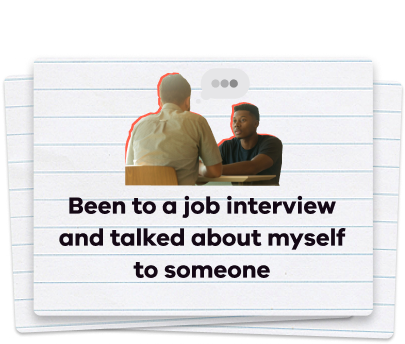Networking is when you get to know people who might be able to help you get a job. Networking can be as simple as talking to someone you already know about looking for work.
People you could talk to might include a teacher, a friend who already has a job, or a family member. You could send them a message, chat to them after class, or invite them for coffee to ask for career advice. You could also ask them if they know anyone who’s looking for workers.
Creating a network
Networking might sound daunting. But you’re probably already doing it without even realising. Here are some basic networking tips.
Step 1: Talk to people about what they do
Ask people where they work and what they do. Listen carefully to what they say and ask lots of questions. You could start by talking to:
- your family
- your friends and their families
- people you work, volunteer or play sport with
- teachers at school
- members of clubs you belong to.
Step 2: Ask for their contact details
When you meet someone who works in an interesting job or does things you’re interested in, like sports, hobbies, art or community projects, ask them for their contact details.
If they don’t mind you getting in touch, you can contact them later on to ask more questions about what they do. You can also ask them if they know anyone else they could introduce you to.
Step 3: Stay in touch
You don't need to contact the people in your network every week, but it helps to keep in touch with them. If you stay in regular contact, they’ll be more likely to remember you if an opportunity comes up.
When staying in touch with your network, whether online or in real life, it's important to remember to:
- always be polite and considerate
- pay careful attention to what people tell you.
- thank people for the help they give you
- try to give back to your networks whenever you can.
Using your network
There are lots of ways you can use your network. It isn't just about them finding you a job. Some ways to use your network include:
- asking for favours – for example, you might need a reference for a job application
- asking for career advice – people are often flattered when you seek them out to hear their opinion.
Expanding your network
The bigger your network, the greater the chance you’ll hear about opportunities like job vacancies or interesting projects. You might also end up with new friends and mentors as well.
Here are some ways you can expand the number of people in your network:
- Get to know people in your local community. Talk to your neighbours or join a community group or social club.
- Volunteer in an area you're interested in.
- Go to events, launches and workshops. Introduce yourself to people you don’t know.
- Take every chance to meet new people. Don’t just talk to your friends at parties.
- Find out what union covers the industry you’re interested in working in, and go to their events.
Online networking
Online networking is when you use networking sites and email to get in touch with people all over the world who do the kinds of work you’re interested in.
Because it’s easy to communicate online, it can be tempting to send lots of messages. Remember, it’s better to form good connections with a few key people rather than sending lots messages to random strangers. Sending lots of messages also runs the risk of annoying people.
Give back to your network
Networking isn’t just about asking for things that you want. It's important to give as much back to your network as you get from it. The more helpful you are, the more people will remember you and want help you too.
Here are some simple ways you can give back to your network:
- If you know someone who’s looking for work, tell them if you hear about a job they might like.
- Introduce your friends to other people in your network.
- Forward emails about job vacancies or social events to people you think might be interested.
- Whenever someone helps you, send them a short thank you note or give them a call to say thanks.
Networking gets easier with practice
Networking gets easier the more you do it. Start with people you already know so you can practise your networking skills. Then gradually expand your network one connection at a time.
Networking doesn’t have to be all serious, either. Remember to enjoy making meaningful connections with people, and to enjoy what you're learning along the way.

